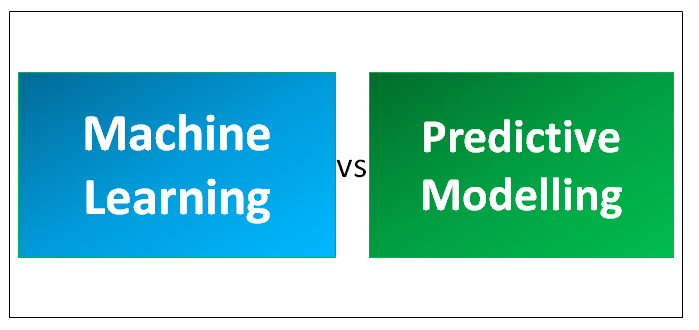Updated June 15, 2023

Differences Between Machine Learning and Predictive Modelling
Machine learning is an area of computer science that uses cognitive learning methods to program systems without the need to be explicitly programmed. In other words, those machines are well known to grow better with experience.
Machine learning is related to other mathematical techniques and also to data mining which encompasses terms such as supervised and unsupervised learning.
Predictive modeling, on the other hand, is a mathematical technique that uses statistics for prediction. It aims to work upon the provided information to reach an end conclusion after an event has been triggered.
In a nutshell, when it comes to data analytics, machine learning is a methodology that is used to devise and generate complex algorithms and models which lend themselves to a prediction. This is popularly known as predictive analysis in commercial use, which is used by researchers, engineers, data scientists, and other analysts to make decisions and provide results and uncover hidden insights by making use of historical learning.
In this post, we are going to study in detail about the differences.
Head-to-Head Comparison Between Machine Learning vs Predictive Modelling (Infographics)
Below is the top 8 Comparison between Machine Learning and Predictive Modelling:

Key Differences Between Machine Learning and Predictive Modelling
Below are the lists of points describe the key differences between Machine Learning and Predictive Modelling:
- Machine learning is an AI technique where the algorithms are given data and are asked to process without a predetermined set of rules and regulations whereas Predictive analysis is the analysis of historical data as well as existing external data to find patterns and behaviors.
- Machine learning algorithms are trained to learn from their past mistakes to improve future performance whereas predictive makes informed predictions based upon historical data about future events only.
- Machine learning is a new generation technology that works on better algorithms and massive amounts of data, whereas predictive analysis is the study and not a particular technology that existed long before Machine learning came into existence. Alan Turing had already made used of this technique to decode the messages during world war II.
- Related practices and learning techniques for machine learning include Supervised and unsupervised learning, while for predictive analysis it is Descriptive analysis, Diagnostic analysis, Predictive analysis, Prescriptive analysis, etc.
- Once our machine learning model is trained and tested for a relatively smaller dataset, then the same method can be applied to hidden data. The data effectively need not be biased as it would result in bad decision-making. In the case of predictive analysis, data is useful when it is complete, accurate, and substantial. Data quality needs to be taken care of when data is ingested initially. Organizations use this to predict forecasts and consumer behaviors and make rational decisions based on their findings. A successful case will surely result in boosting business and the firm’s revenues.
Machine Learning vs Predictive Modelling Comparison Table
Following is the list of points that show the comparison between Machine Learning and Predictive Modelling.
|
Basis for Comparison |
Machine learning |
Predictive Modeling |
| Definition | The method used to devise complex algorithms and models that lend themselves to prediction. This is the core principle behind predictive modeling. | An advanced form of basic descriptive analytics which makes use of the current and historical set of data to provide an outcome. This can be said to be the subset and an application of machine learning. |
| Modus Operandi | An adaptive technique is where the systems are smart enough to adapt and learn as and when a new set of data is added without the need of being directly programmed. Previous calculations will be used to provide effective results. | Models are known to make use of classifiers and detection theory to guess the probability of an outcome given a set of input data. |
| Approaches and Models |
|
|
| Applications |
|
|
| Update Handling | A statistical model is updated automatically | Data scientists need to run the model manually multiple times |
| Requirement Clarification | A proper set of requirements and business justifications need to be provided | A proper set of business justifications and requirements needs to be clarified |
| Driving Technology | Machine learning is data-driven | Predictive modeling is used in case driven |
| Drawbacks |
|
|
Conclusion
Both these technologies are providing solutions to organizations worldwide in their own realms. Top organizations like Google, Amazon, IBM, etc., are investing heavily in these artificial intelligence and machine learning algorithms to tackle real-world problems in a better and an efficient manner. It is up to you to decide what kind of method your business need. Go ahead and write to us in the comment section below about which technology benefited you in what way.
Follow our blog for more Big data and current technology-based articles.
Recommended Articles
This has been a guide to Machine Learning vs Predictive Modelling. Here we have discussed Machine Learning vs Predictive Modelling head-to-head comparison, key differences along with infographics and comparison table. You may also look at the following articles to learn more –

